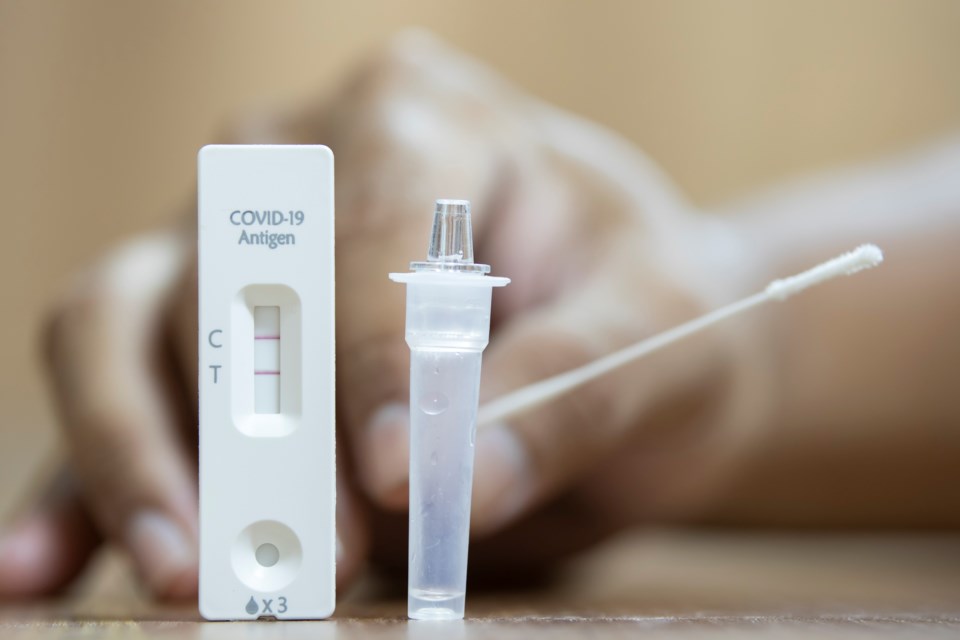LAKELAND – As soon as rapid test kits for COVID-19 were made available for small business through the Cold Lake Regional Chamber of Commerce, Kurt Lawrence, a Cold Lake business owner, made sure all his forms were filled out so he could receive a supply of test kits that would last his business until the new year.
On Sept. 16, Lawrence picked up 125 rapid testing kits free of charge from his local Chamber.
The following Monday, Lawrence and his staff took their first rapid tests. Since then, each staff member, full-time and part-time, vaccinated and unvaccinated, have completed a rapid test at the start of each work week.
“I saw it in a Chamber (newsletter) that they sent out and I just thought it would be a really good idea for my staff and I, just to know that we’re cleared and clean before we carried on with work,” Lawrence tells Lakeland This Week.
In an effort to stop the spread of COVID-19, Health Canada has provided participating Chambers of Commerce with rapid test kits distributed by the province that can be given to small business with 150 employees or less to identify pre-symptomatic and asymptomatic cases of COVID in a workplace.
The program’s guidelines requires that employers carry out regularly testing of staff, at a minimum of once per week to a maximum of twice weekly, explains Sherri Buckle, the executive director for the Cold Lake Regional Chamber of Commerce.
According to Buckle, the purpose is to mitigate potential spread from those who do not show symptoms and would otherwise be in the workplace.
“This also includes weekly reporting to our Chamber. We then gather all of the reports into one, and do our weekly report to the provincial government,” she says, adding the data forwarded to the province is strictly a numbers report – no individual or business is identified in the report.
Eager to participate in the program once it was rolled out in his area, Lawrence, the owner of K3 Promotions Inc., says from his perspective there have been no disadvantages to the rapid testing program.
“The advantages, probably the biggest one, is everybody seems a little bit more confident after the test,” he says. “I do have a couple of (unvaccinated) staff here, so this is one way that I can make sure that they are safe, as well as our vaccinated staff are not passing (the virus) on to them.”
At first, staff were reluctant to take the weekly rapid test, says Lawrence, but once they became accustomed to the uncomfortable tickle of the mid-nasal swab, they grew to appreciate having access to the test after spending time outside of the community.
“I have eight to nine staff and some of them are going to Costco or they're going to Edmonton to see their parents or whatever, and I can see when they come back there is a little bit of caution amongst the staff until right after the test results.”
Since beginning the program on Sept. 20, Lawrence has carried out roughly 80 rapid tests. All results to date have been negative.
“I think (the rapid testing program) is a valuable tool for employers and especially small businesses like mine. I can't afford to have people do the PRC test or anything like that. So, for small businesses it's a really good tool. The biggest thing is I just wish there were a lot more people doing it.”
Demand for rapid tests grow among local businesses
The St. Paul and District Chamber of Commerce has 62 businesses taking part in their rapid testing program, which includes a handful of businesses from Elk Point.
The Chamber began the program near the end of June and have since distributed 4,100 rapid tests to local businesses. To date, the St. Paul Chamber has reported 12 positive COVID cases.
Diane Ellis, the executive director of the St. Paul Chamber, says when the program first launched very few businesses jumped on board. However, as active cases began to rise in the region towards the end August, leading to the fourth wave, more organizations began seeing the value of testing staff in the hopes of early detection of the virus.
She says this has allowed businesses to keep their doors open and prevent workplace outbreaks.
The Lac La Biche and District Chamber of Commerce began offering the rapid testing program as soon as the province had rolled it out. Starting June 14, the Lac La Biche Chamber began giving out COVID-19 rapid kits to businesses that requested them.
Similar to St. Paul, the Lac La Biche rapid test roll out had a slow start.
Karen Collins, the executive director of the Lac La Biche Chamber, attributes the early hesitation to misconceptions about the program.
“In the beginning, I think businesses were leery to sign up because they thought it would give them a black mark if they had a positive test result or that AHS could shut them down. Now I think there is a better understanding of the program overall,” Collins explains. “It has actually become a remarkable resource for businesses.”
The Lac La Biche Chamber has distributed 8,450 rapid test kits to 117 local businesses with 4,018 kits being used so far. Of the tests administered, 56 pre-symptomatic and asymptomatic COVID cases have been detected.
The Bonnyville and District Chamber of Commerce has partnered with 38 businesses, handing out 1,695 testing kits. To date, the program has identified 15 positive cases.
Working with 20 small businesses, the Cold Lake Regional Chamber of Commerce has provided more than 1,500 rapid test kits. Of the tests administered five cases of Coronavirus have been detected so far.
Recently, Alberta Health Services informed Alberta Chambers of Commerce that rapid test kits labelled with the expiration date of Nov. 11, 2021, have been extended for valid use until Nov. 11, 2022, Ellis tells Lakeland This Week.



